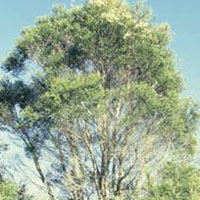Penn Herb Wellness Guide
Tea TreeFind Products

Parts Used & Where Grown
The tea tree grows in Australia and Asia. This tall evergreen tree has a white, spongy bark. The oil from the leaves is used medicinally.
- Reliable and relatively consistent scientific data showing a substantial health benefit.
- Contradictory, insufficient, or preliminary studies suggesting a health benefit or minimal health benefit.
- For an herb, supported by traditional use but minimal or no scientific evidence. For a supplement,little scientific support.
Our proprietary “Star-Rating” system was developed to help you easily understand the amount of scientific support behind each supplement in relation to a specific health condition. While there is no way to predict whether a vitamin, mineral, or herb will successfully treat or prevent associated health conditions, our unique ratings tell you how well these supplements are understood by the medical community, and whether studies have found them to be effective for other people.
For over a decade, our team has combed through thousands of research articles published in reputable journals. To help you make educated decisions, and to better understand controversial or confusing supplements, our medical experts have digested the science into these three easy-to-follow ratings. We hope this provides you with a helpful resource to make informed decisions towards your health and well-being.
This supplement has been used in connection with the following health conditions:
| Used for | Amount | Why |
|---|---|---|
Acne Vulgaris | Apply 5% oil twice per day | Although tea tree oil is slower and less potent than benzoyl peroxide, it has been shown to improve acne with far fewer side effects. |
Athlete’s Foot | Apply a 10% cream twice per day | Tea tree oil has been traditionally used to treat athlete’s foot and has been shown to reduce athlete’s foot symptoms just as effectively as drugs and better than placebo. |
Yeast Infection | Swish 15 ml of a 5% or less solution in mouth for 30 to 60 seconds four times per day, then spit out | One trial found that a mouthwash with diluted tea tree oil was effective in decreasing the growth of Candida albicans in people with oral Candida infections (thrush). |
Halitosis | Refer to label instructions | Volatile oils made from tea tree have antibacterial properties and may be effective in mouthwash or toothpaste form. |
Head Lice | Apply shampoo to hair and leave on for one hour before washing out | as Paw Paw, Thyme Oil, and Tea Tree Oil Shampoo An herbal shampoo containing a standardized extract of paw paw, thyme oil, and tea tree oil has been found to be effective in treating head lice. |
HIV and AIDS Support | Refer to label instructions | A 5% solution of tea tree oil has been shown to eliminate oral thrush in people with AIDS, according to one trial. |
Infection | Refer to label instructions | Tea tree is an herb that directly attack microbes. |
Vaginitis | Refer to label instructions | Topically applied tea tree oil has been used successfully as a topical treatment for Trichomonas, Candida albicans, and other vaginal infections. |
Wound Healing | Refer to label instructions | Tea tree oil may be applied topically to skin wounds, although it is not recommended for burns. |
Traditional Use (May Not Be Supported by Scientific Studies)
Australian Aborigines used the leaves to treat cuts and skin infections. They would crush the leaves and apply them to the affected area. Captain James Cook and his crew named the tree “tea tree,” using its leaves as a substitute for tea as well as to flavor beer. Australian soldiers participating in World War I were given tea tree oil as a disinfectant, leading to a high demand for its production.
Copyright 2026 TraceGains, Inc. All rights reserved.
Learn more about TraceGains, the company.
The information presented by TraceGains is for informational purposes only. It is based on scientific studies (human, animal, or in vitro), clinical experience, or traditional usage as cited in each article. The results reported may not necessarily occur in all individuals. Self-treatment is not recommended for life-threatening conditions that require medical treatment under a doctor's care. For many of the conditions discussed, treatment with prescription or over the counter medication is also available. Consult your doctor, practitioner, and/or pharmacist for any health problem and before using any supplements or before making any changes in prescribed medications. Information expires December 2026.


